Continuous Integration and Continuous Deployment (CI/CD) enables modern software development teams to deliver high-quality code faster and more efficiently. But to master CI/CD, you need the right training.
In this guide, we've rounded up the best CI/CD courses up for grabs. Whether you're a beginner looking to understand the basics or an experienced developer aiming to level up, these courses will help you build the skills you need to excel in a competitive industry.
Best CI/CD Courses Shortlist
Here's a shortlist of the best CI/CD courses I think are worth your time in 2025:
- Continuous Integration and Continuous Delivery (IBM)
- Building a Modern CI/CD Pipeline with Jenkins (Pluralsight)
- Continuous Integration and Deployment (Udacity)
- GitLab CI/CD (GitLab University)
- Learn CI/CD Pipeline With Jenkins, Python, Docker, DockerHub (Udemy)
- AWS: CI/CD Pipelines and Deployment Strategies (Whizlabs)
- GitHub Actions for CI/CD (LinkedIn Learning)
- CI/CD for Machine Learning (DataCamp)
- The Complete Jenkins DevOps CI/CD Pipeline Bootcamp (Udemy)
- CI/CD with Jenkins and GitLab Course (Koenig Solutions)
- DevOps Foundations: Continuous Integration and Continuous Delivery (Pluralsight)
- Project in DevOps: Jenkins CI/CD for Kubernetes Deployments (iwayQ Technology)
- Developing CI/CD Solutions with Azure DevOps (LinkedIn Learning)
- DevOps: CI/CD with Jenkins (Udemy)
- Build CI/CD Pipelines, Monitoring, and Logging (Udacity)
- CI/CD for Software Developers (Codio)
- CI/CD with Docker and Kubernetes Course (Koenig Solutions)
- DevOps Foundations: Continuous Delivery/Continuous Integration (LinkedIn Learning)
- Continuous Integration & Continuous Deployment with Jenkins (LearnKartS)
Find out each detail of the course below.
Overview Of The Best CI/CD Courses
1. Continuous Integration and Continuous Delivery (IBM)
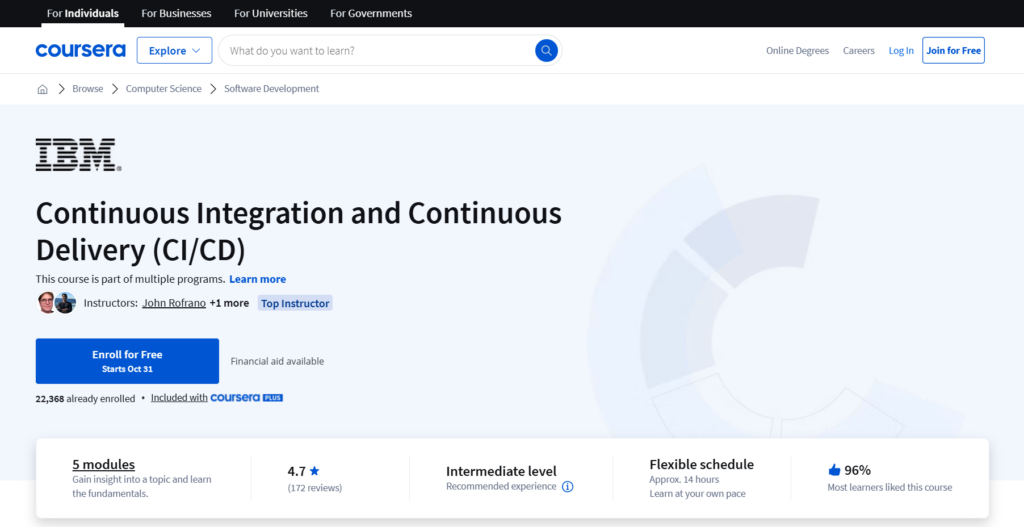
This course gives a hands-on introduction to building CI/CD pipelines with a focus on automation in DevOps. Through interactive labs, it explores CI/CD tools, coding workflows, and container deployment to Kubernetes.
- Who It’s For: Individuals interested in CI/CD practices
- Topics Covered:
- CI/CD concepts
- Deployment strategies
- Automation techniques
- OpenShift Pipelines and Argo CD
- Infrastructure as Code with Terraform
- DevOps and GitOps with OpenShift
- Online, In-Person, or Both? Online
- Exam Required? No
- Duration: 14 hours
- How Many Hours Of Instruction: Self-paced
- Eligibility Requirements: None
- Price: Enroll for free
- Take The Course: Coursera
2. Building a Modern CI/CD Pipeline with Jenkins (Pluralsight)
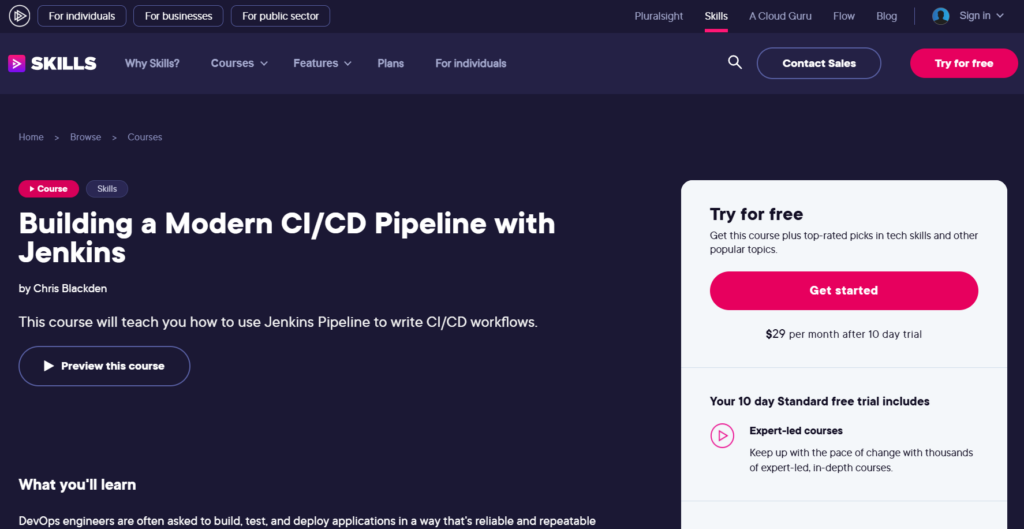
This course guides you through creating and managing CI/CD workflows using Jenkins Pipeline, focusing on automation and deployment reliability. It covers pipeline syntax, flow controls, and shared libraries to support robust CI/CD pipelines.
- Who It’s For: Software engineers and DevOps professionals
- Topics Covered:
- Jenkins Pipeline syntax and features
- CI/CD workflow automation
- Flow control steps and deployment conditions
- Building and testing code with Jenkins
- Security and compliance integration
- Creating shared libraries for pipelines
- Online, In-Person, or Both? Online
- Exam Required? No
- Duration: 1 hour and 43 minutes
- How Many Hours Of Instruction: Self-paced
- Eligibility Requirements: None
- Price: $19 per month (10-day free trial)
- Take The Course: Pluralsight
3. Continuous Integration and Deployment (Udacity)
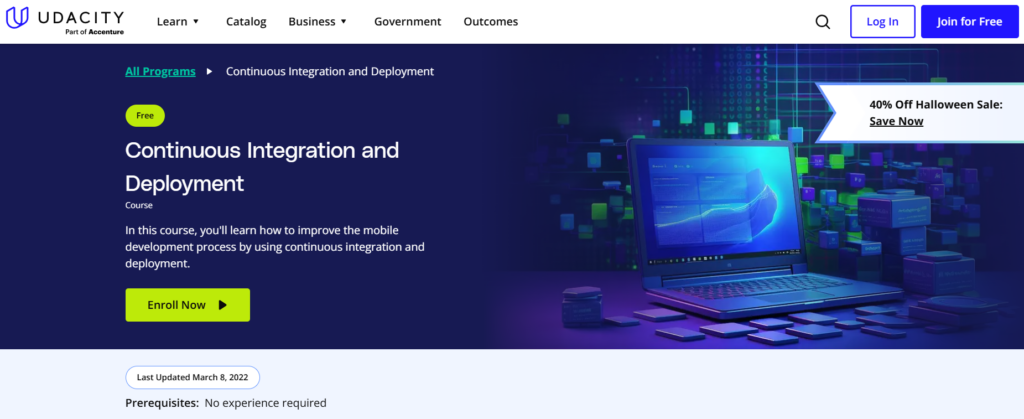
This course teaches how to set up a continuous integration and deployment system for mobile development, focusing on ensuring app functionality and streamlined feedback integration. It includes configuration of Git workflows and automated testing, with no prerequisites required.
- Who It’s For: Developers and IT professionals
- Topics Covered:
- Continuous integration setup with Buddybuild
- GitFlow branching structure
- Unit and UI testing for app functionality
- Continuous deployment and device provisioning
- Feedback consolidation with BuddyBuildSDK
- Online, In-Person, or Both? Online
- Hours of Instruction: Self-paced
- Exam Required? No
- Eligibility Requirements: None
- Price: Free
- Take The Course: Udacity
4. GitLab CI/CD (GitLab University)
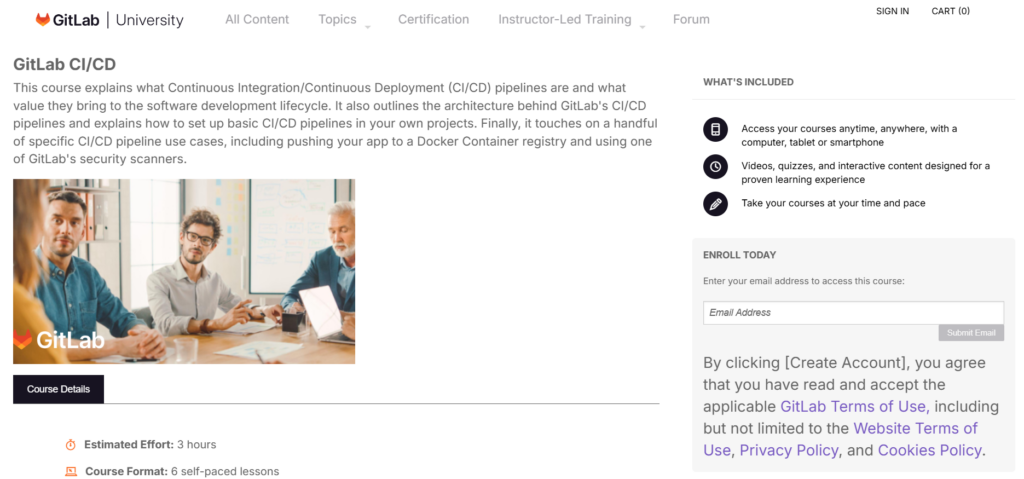
This course introduces GitLab CI/CD pipelines, guiding learners through setting up pipelines, deploying applications, and using security scanning. It includes practical exercises with GitLab Runner and .gitlab-ci.yml file configurations to automate and enhance software delivery.
- Who It’s For: GitLab users, DevOps engineers, quality assurance teams, release engineers, and development teams
- Topics Covered:
- CI/CD pipeline setup and configuration
- GitLab Runner installation and usage
- Executor selection for different development platforms
- Feature branching and pipeline automation
- Artifact management and dependency caching
- Docker image deployment to GitLab registry
- GitLab security scanning
- Online, In-Person, or Both? Online
- Exam Required? No
- Duration: 3 hours
- How Many Hours Of Instruction: Self-paced
- Eligibility Requirements:
- Git and GitLab basics
- Take The Course: GitLab University
5. Learn CI/CD Pipeline With Jenkins, Python, Docker, DockerHub (Udemy)
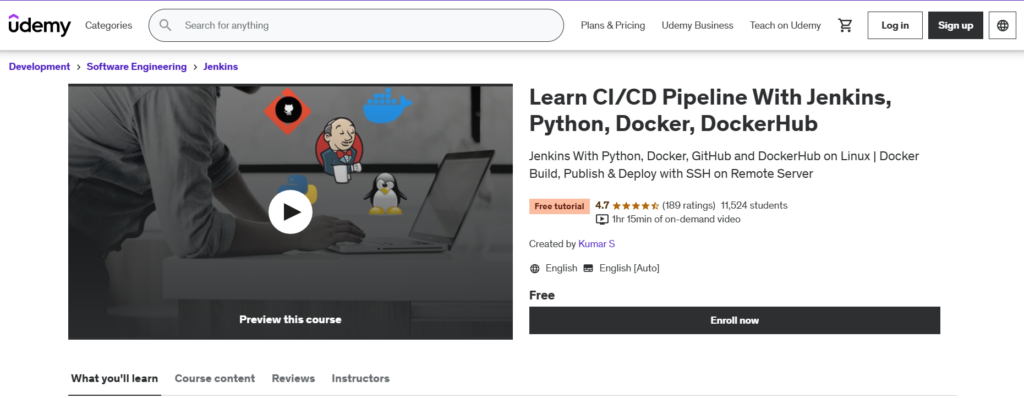
This course teaches the complete CI/CD pipeline setup using Jenkins, Docker, Python, and DockerHub in a Linux environment. It walks through Dockerizing applications, configuring Jenkins pipelines, and deploying containers from DockerHub to remote servers.
- Who It’s For: Beginners to intermediate developers and individuals eager to explore CI/CD processes
- Topics Covered:
- Jenkins pipelines
- Python scripting
- Docker integration
- Pipeline overview
- CI/CD definition
- Jenkins configurations
- Jenkins job
- Online, In-Person, or Both? Online
- Exam Required? No
- Duration: 1 hour and 15 minutes
- How Many Hours Of Instruction: Self-paced
- Eligibility Requirements:
- Basic knowledge of Jenkins and CI/CD and
- Basic knowledge of Git, GitHub Docker, DockerHub
- PC or Laptop
- Internet connection
- Price: Free
- Take The Course: Udemy
6. AWS: CI/CD Pipelines and Deployment Strategies (Whizlabs)
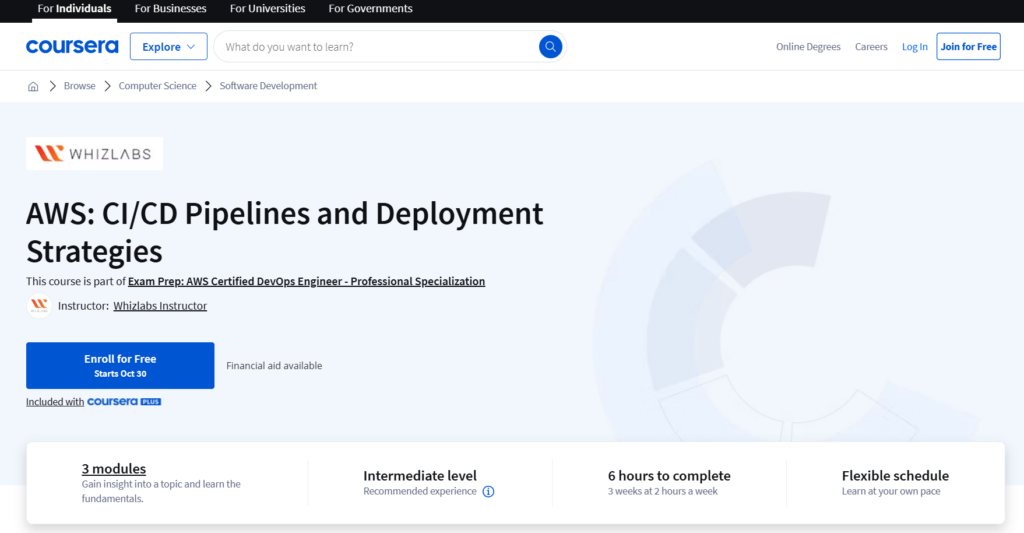
This course details the setup and management of CI/CD pipelines in AWS, focusing on automation and deployment strategies. It includes three modules covering SDLC phases, pipeline configuration with Amazon ECS, and deployment strategy optimization.
- Who It’s For: AWS users and cloud engineers
- Topics Covered:
- Software development lifecycle in AWS
- CI/CD pipeline setup with Amazon ECS
- Deployment strategies in AWS
- Artifact management and testing
- Online, In-Person, or Both? Online
- Exam Required? No
- Duration: 6 hours
- How Many Hours Of Instruction: 2 hours per week (self-paced)
- Eligibility Requirements: None
- Price: Enroll for free
- Take The Course: Coursera
7. GitHub Actions for CI/CD (LinkedIn Learning)
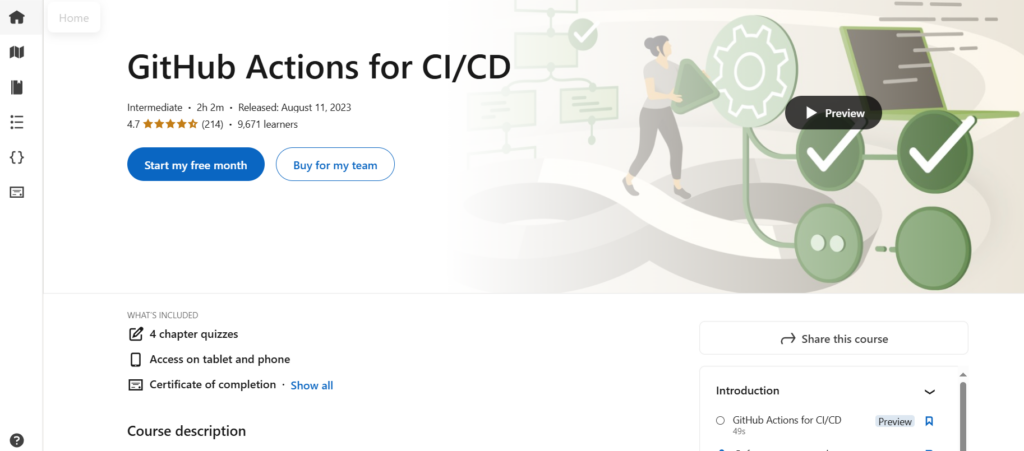
This online course focuses on implementing CI/CD workflows using GitHub Actions, providing hands-on exercises and industry best practices for automating software delivery. It guides learners through setting up, testing, and deploying workflows for open-source and private projects.
- Who It’s For: Developers using GitHub
- Topics Covered:
- GitHub Actions setup
- Workflow automation
- CI/CD integration
- Best practices for creating workflows
- Online, In-Person, or Both? Online
- Exam Required? No
- Duration: 2 hours and 2 minutes
- How Many Hours Of Instruction: Self-paced
- Eligibility Requirements: None
- Price: Free for a month
- Take The Course: LinkedIn Learning
8. CI/CD for Machine Learning (DataCamp)
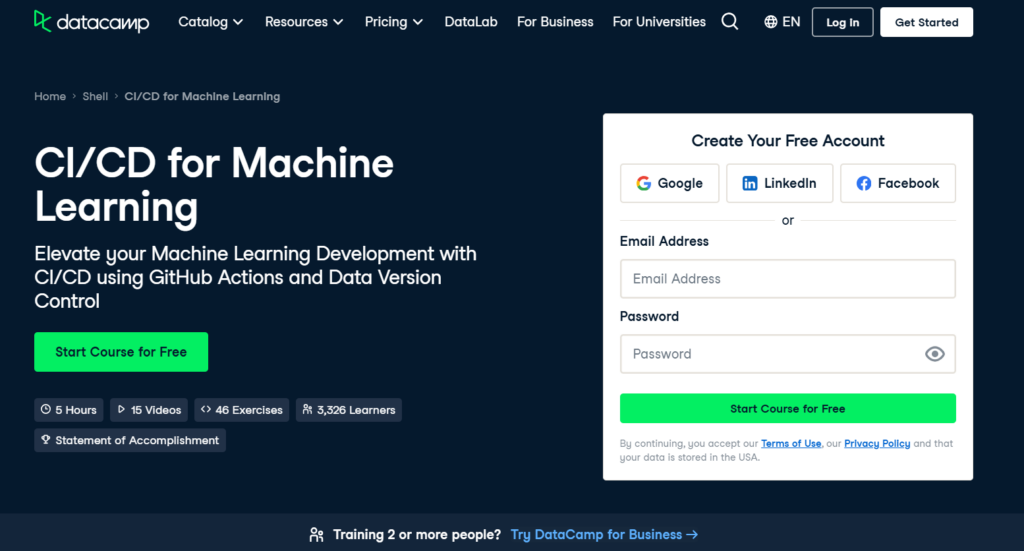
This course integrates CI/CD practices specifically for machine learning workflows, utilizing GitHub Actions and Data Version Control (DVC) to automate model training, testing, and deployment. It includes automated pull requests, versioned datasets, and hyperparameter tuning for robust machine-learning pipelines.
- Who It’s For: Data scientists and ML engineers
- Topics Covered:
- ML model deployment
- Monitoring and logging
- CI/CD automation
- Machine Learning Integration
- Introduction to CI/CD and YAML
- Versioning Datasets with DVC
- Optimizing model performance and tuning HP
- Online, In-Person, or Both? Online
- Exam Required? No
- Duration: 5 hours
- How Many Hours Of Instruction: Self-paced
- Eligibility Requirements: None
- Price: Free
- Take The Course: DataCamp
9. The Complete Jenkins DevOps CI/CD Pipeline Bootcamp (Udemy)
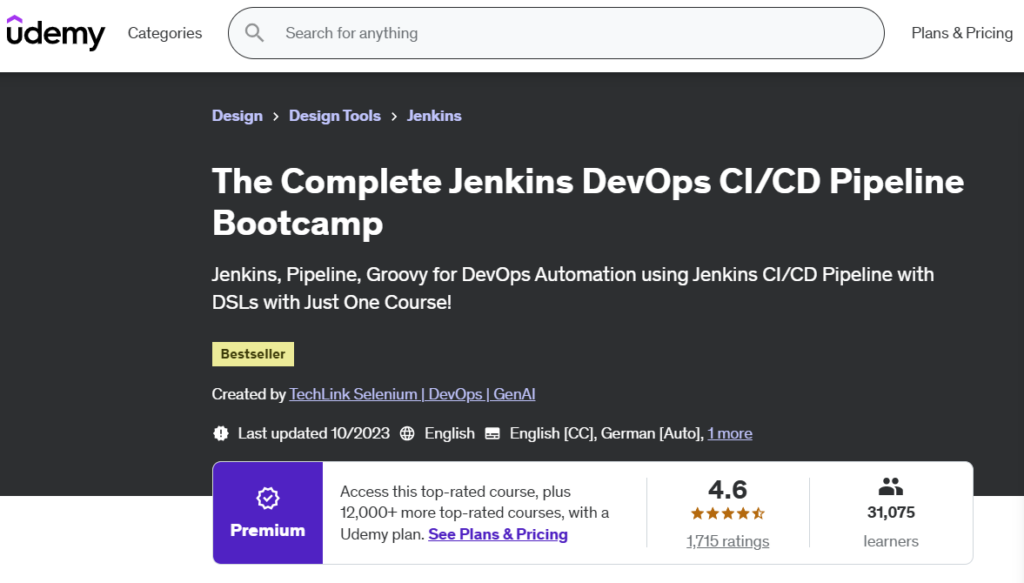
This course provides hands-on training for creating and managing Jenkins CI/CD pipelines, focusing on real-world automation setups. It covers Jenkins installation, pipeline creation, and integration with code quality tools for efficient deployment workflows.
- Who It’s For: Best for beginners, DevOps engineers looking to learn Jenkins, developers, and IT admins
- Topics Covered:
- Jenkins architecture and installation
- Creating pipelines with Jenkins
- Jenkins plugins and tools
- Managing Jenkins jobs and builds
- Integrating Repository to Jenkins
- Building Reusable Pipelines
- Jenkins Security and Aspect
- Project Build Tool: MAVEN
- Online, In-Person, or Both? Online
- Exam Required? No
- Duration: 10 hours
- How Many Hours Of Instruction: Self-paced
- Eligibility Requirements:
- Basic understanding of software development processes
- A computer with Windows, OSX, or Linux
- Price: $84.99
- Take The Course: Udemy
10. CI/CD with Jenkins and GitLab Course (Koenig Solutions)
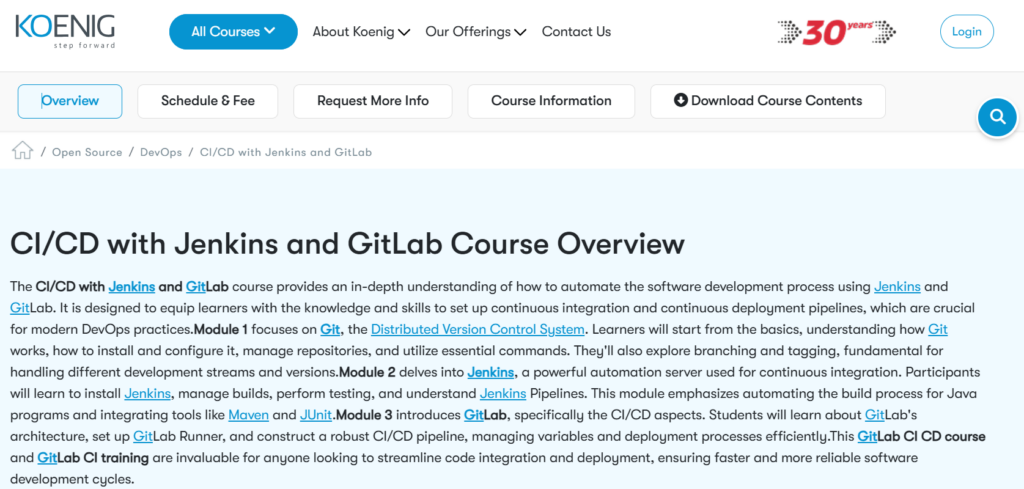
This course provides a comprehensive approach to setting up and managing CI/CD pipelines with Jenkins and GitLab, focusing on automation for streamlined deployments. It covers Git basics, Jenkins build automation, and GitLab’s CI/CD architecture for efficient code integration and deployment workflows.
- Who It’s For: DevOps engineers, developers interested in GitLab and Jenkins integration, software developers, automation engineers, technical project managers, and IT professionals
- Topics Covered:
- Git installation and repository management
- Branching, tagging, and version control
- Jenkins setup and build automation
- Integrating Jenkins with Maven and JUnit
- GitLab Runner setup and pipeline management
- Variables and deployment configuration in GitLab CI/CD
- Online, In-Person, or Both? Both
- Exam Required? No
- Duration: 24 hours
- How Many Hours Of Instruction: 8 hours per day
- Eligibility Requirements:
- Basic understanding of software development
- Familiarity with command-line tools (Linux, macOS, or Windows)
- Fundamental programming knowledge (Java preferred)
- Prior experience with version control (Git helpful, not required)
- Introductory knowledge of automated testing and builds
- Basic awareness of CI/CD concepts
- Price:
- 1-on-1: $1,575
- Public: $1,150
- Flexi: $258 (visit page for more info)
- Take The Course: Koenig Solutions
11. DevOps Foundations: Continuous Integration and Continuous Delivery (Pluralsight)
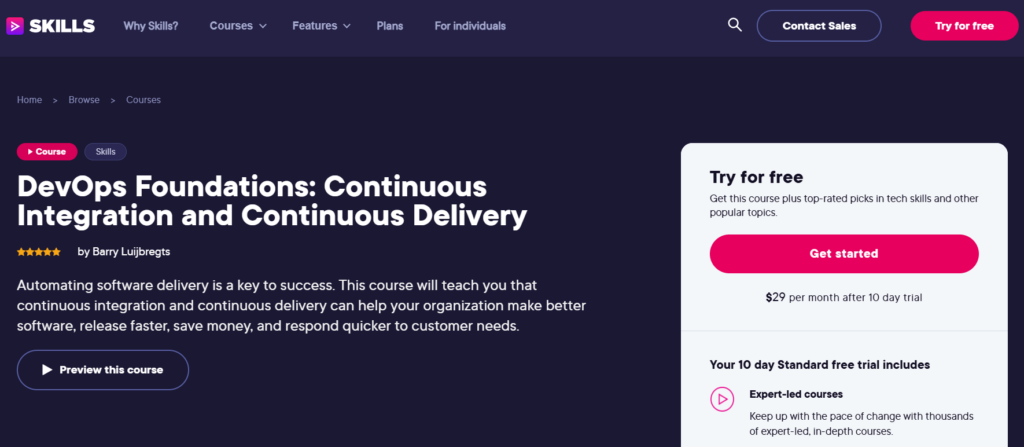
This course explains the core principles of Continuous Integration and Continuous Delivery, focusing on automating software compilation and streamlining deployment readiness. It covers CI/CD practices to optimize software delivery and enhance responsiveness to business needs.
- Who It’s For: DevOps beginners looking to understand CI/CD concepts
- Topics Covered:
- Foundations of continuous integration
- Automated software compilation
- Continuous delivery and deployment practices
- Optimizing the software development lifecycle
- Online, In-Person, or Both? Online
- Exam Required? No
- Duration: 1 hour and 3 seconds
- How Many Hours Of Instruction: Self-paced
- Eligibility Requirements: None
- Price: $29 per month (10-day free trial)
- Take The Course: Pluralsight
12. Project in DevOps: Jenkins CI/CD for Kubernetes Deployments (iwayQ Technology)
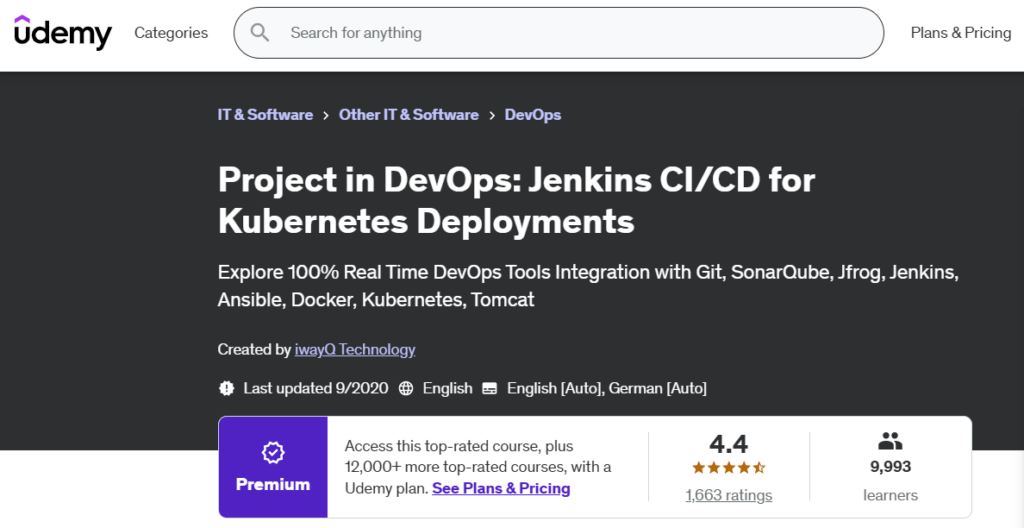
This course provides hands-on experience deploying applications on Kubernetes using a Jenkins CI/CD pipeline within a Micro Services Architecture. It integrates DevOps tools such as Ansible, SonarQube, and Docker to automate application builds, quality checks, and deployments.
- Who It’s For: DevOps professionals, developers working with Kubernetes, and AWS Cloud engineers
- Topics Covered:
- Kubernetes and Jenkins integration
- Automating deployments with Jenkins
- Building and deploying containerized applications
- Monitoring Jenkins pipelines
- DevOps real-time project
- Git architecture
- Bit Bucket architecture
- Apache Maven
- Online, In-Person, or Both? Online
- Exam Required? No
- Duration: 4 hours
- How Many Hours Of Instruction: Self-paced
- Eligibility Requirements:
- Basic knowledge of AWS, Linux, and DevOps
- Price: $54.99
- Take The Course: Udemy
13. Developing CI/CD Solutions with Azure DevOps (LinkedIn Learning)
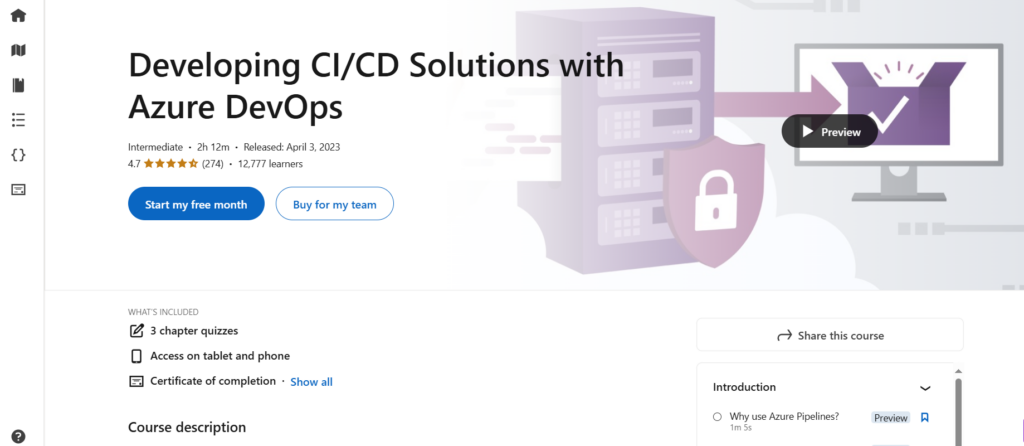
This course shows how to create fully automated CI/CD pipelines using Azure DevOps, focusing on continuous integration, deployment, and security measures within Azure Cloud. It guides users through configuring pipelines for .NET applications, enabling efficient testing, and deploying to Azure App Service.
- Who It’s For: Developers and DevOps engineers working with Microsoft Azure
- Topics Covered:
- Azure DevOps pipelines
- Automating builds and tests with Azure
- Deploying applications to Azure services
- Managing repositories and workflows
- Enabling CI and CD targeting Azure Cloud
- Designing a Build and Release Pipelines
- Maximizing Azure Pipelines
- Online, In-Person, or Both? Online
- Exam Required? No
- Duration: 2 hours and 12 minutes
- How Many Hours Of Instruction: Self-paced
- Eligibility Requirements: None
- Price: Free for a month
- Take The Course: LinkedIn Learning
14. DevOps: CI/CD with Jenkins (Udemy)
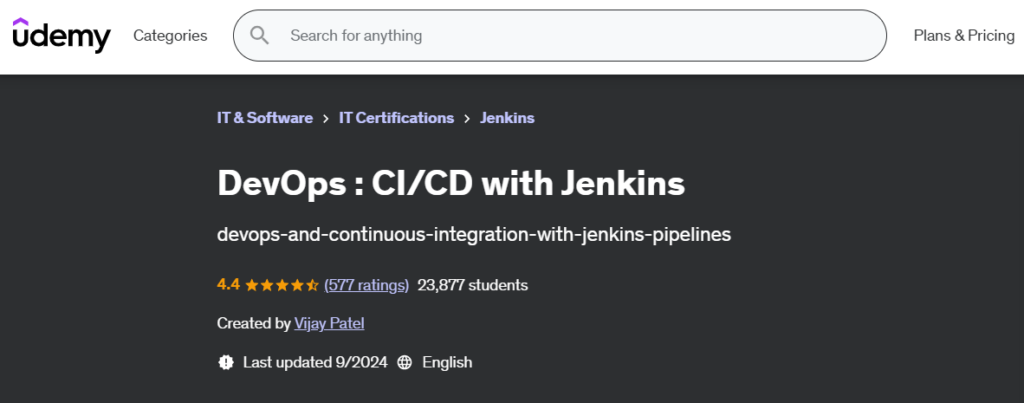
This course covers the essentials of building CI/CD pipelines with Jenkins, focusing on automation and integration in an agile environment. It includes configuring Jenkins with plugins, GitHub integration, and managing to build artifacts with tools like Gradle and Artifactory.
- Who It’s For: DevOps engineers, developers wanting to master Jenkins, automation engineers, software developers, IT administrators, and IT freshers
- Topics Covered:
- Jenkins installation and configuration
- Setting up CI/CD pipelines
- Jenkins integration with version control systems
- Automating builds, tests, and deployments
- Introduction to Continuous Integration
- Importance of Continuous Integration
- Managing the build artifacts
- Online, In-Person, or Both? Online
- Exam Required? No
- Duration: 1 hour and 27 minutes
- How Many Hours Of Instruction: Self-paced
- Eligibility Requirements:
- Access to a physical or virtual machine for software installation
- Basic understanding of software development processes
- Price: $19.99
- Take The Course: Udemy
15. Build CI/CD Pipelines, Monitoring, and Logging (Udacity)
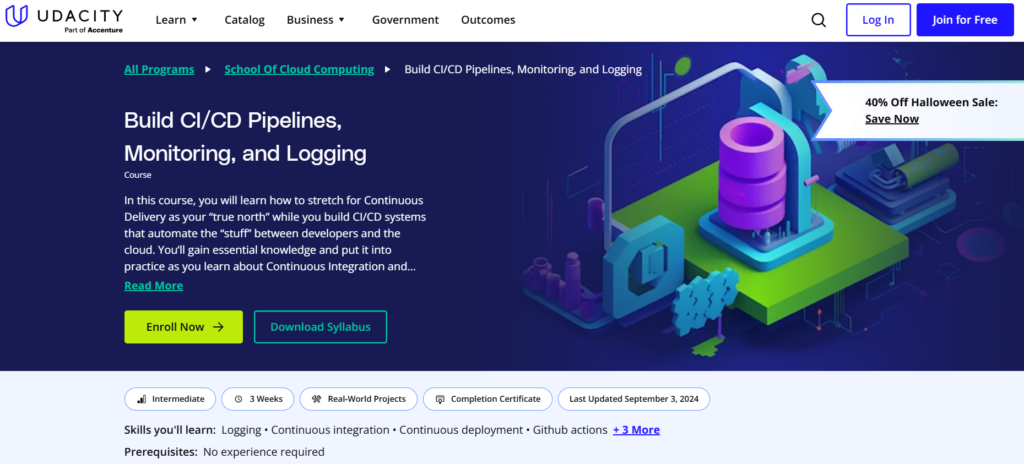
This course guides learners through building and deploying CI/CD pipelines with monitoring and logging capabilities using tools like GitHub Actions and AWS CloudFormation. It provides hands-on projects to reinforce CI/CD pipeline creation and focuses on achieving continuous delivery goals.
- Who It’s For: Intermediate DevOps learners looking for hands-on pipeline development experience
- Topics Covered:
- CI/CD pipelines
- Monitoring and logging solutions
- Automated testing and deployment
- Pipeline scaling and optimization
- Introduction to CI/CD
- Building CI Pipeline
- Enabling CD Pipelines
- Movie Picture Pipeline
- Online, In-Person, or Both? Online
- Exam Required? No
- Duration: 3 weeks
- How Many Hours Of Instruction: Self-paced
- Eligibility Requirements: None
- Price:
- All Access Monthly: $249 per month
- All Access Bundle: $211.50/month (for a 4-month bundle)
- Take The Course: Udacity
16. CI/CD for Software Developers (Codio)
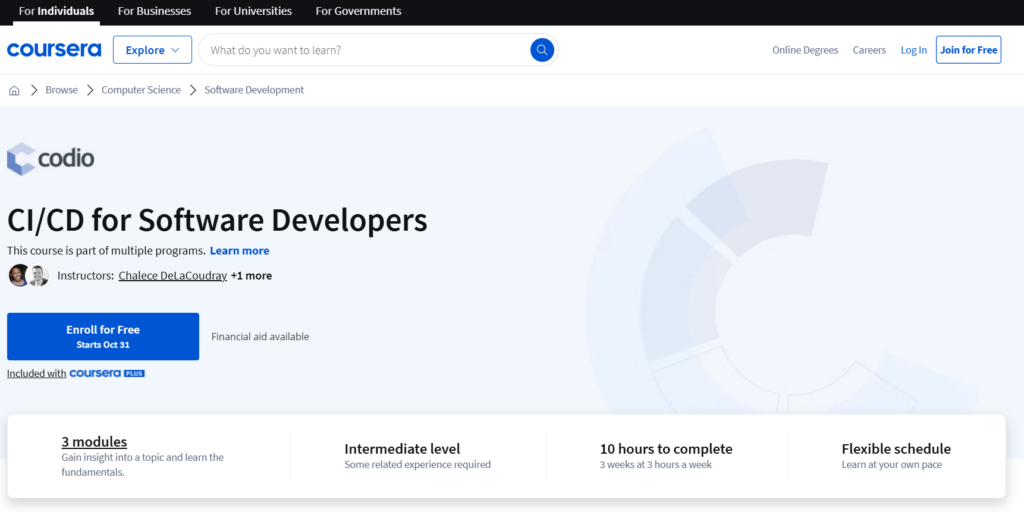
This course teaches software developers to build, test, and deploy code through automated CI/CD pipelines, using GitHub Actions for version control and quality assurance. It concludes with a capstone project that combines automation, deployment, and secret management.
- Who It’s For: Software developers wanting to implement CI/CD in their projects
- Topics Covered:
- GitHub Actions for CI/CD
- Build and test automation
- Code quality checks
- Deployment processes and secret management
- Online, In-Person, or Both? Online
- Exam Required? No
- Duration: 10 hours
- How Many Hours Of Instruction: 3 hours per week (self-paced)
- Eligibility Requirements:
- GitHub account
- Price: Enroll for free
- Take The Course: Coursera
17. CI/CD with Docker and Kubernetes Course (Koenig Solutions)
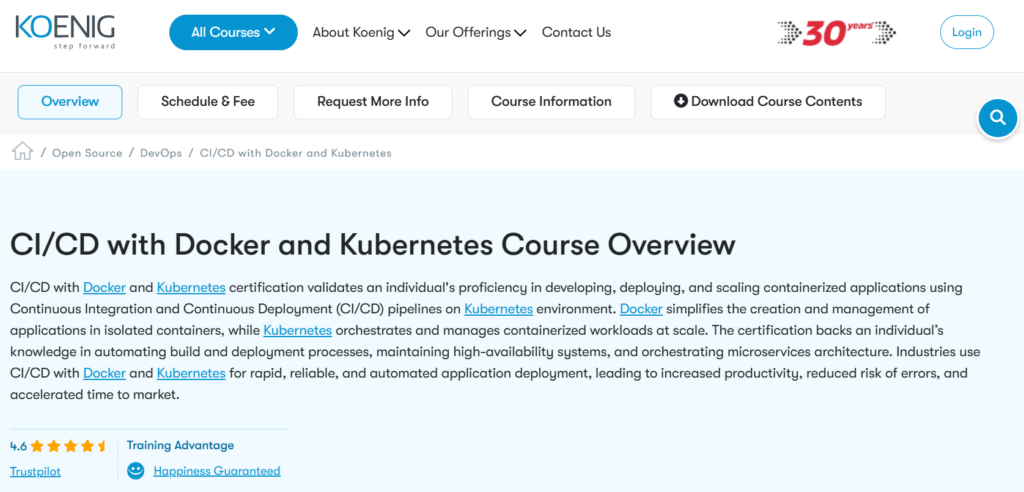
This course covers the setup and management of CI/CD pipelines with Docker and Kubernetes, focusing on deployment automation and container orchestration in production environments. It includes hands-on learning with Jenkins, Docker fundamentals, and Kubernetes cluster creation.
- Who It’s For: DevOps engineers, developers interested in Docker and Kubernetes, system administrators, software testers, networking professionals, IT professionals, and project managers in IT companies
- Topics Covered:
- Docker and Kubernetes basics
- CI/CD pipeline with Docker
- Orchestrating deployments with Kubernetes
- Managing containerized applications
- Automating build and deployment processes
- High-availability systems
- Online, In-Person, or Both? Both
- Exam Required? No
- Duration: 72 hours
- How Many Hours Of Instruction: 8 hours per day
- Eligibility Requirements:
- Basic understanding of Linux
- Knowledge of Python or Shell
- Familiarity with AWS
- Basic understanding of networking and system architecture
- Prior experience with container technology
- Understanding of DevOps principles
- Familiarity with YAML syntax
- Price:
- 1-on-1: $3,575
- Public: $2,850
- Take The Course: Koenig Solutions
18. DevOps Foundations: Continuous Delivery/Continuous Integration (LinkedIn Learning)
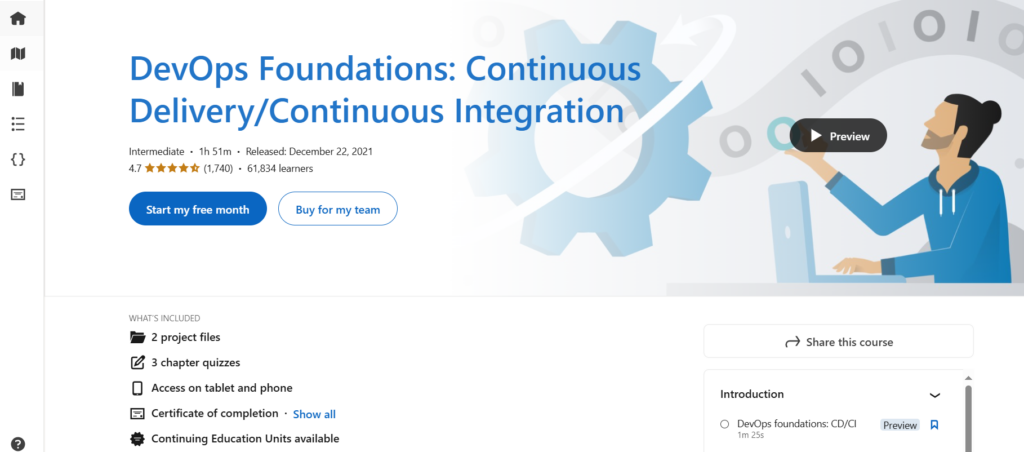
This course teaches continuous integration and delivery concepts by guiding you through building a complete CI/CD pipeline for a Golang application, from development to production. It includes hands-on demonstrations of version control, artifact building, testing, deployment, best practices, and common CI/CD challenges.
- Who It’s For: Developers and IT professionals
- Topics Covered:
- Version control and artifact creation
- Automated unit testing
- Deployment strategies
- CI/CD pipeline best practices
- Managing CI/CD pitfalls and workarounds
- Online, In-Person, or Both? Online
- Exam Required? No
- Duration: 1 hour and 50 minutes
- How Many Hours Of Instruction: Self-paced
- Eligibility Requirements: None
- Price: Free for a month
- Take The Course: LinkedIn Learning
19. Continuous Integration & Continuous Deployment with Jenkins (LearnKartS)
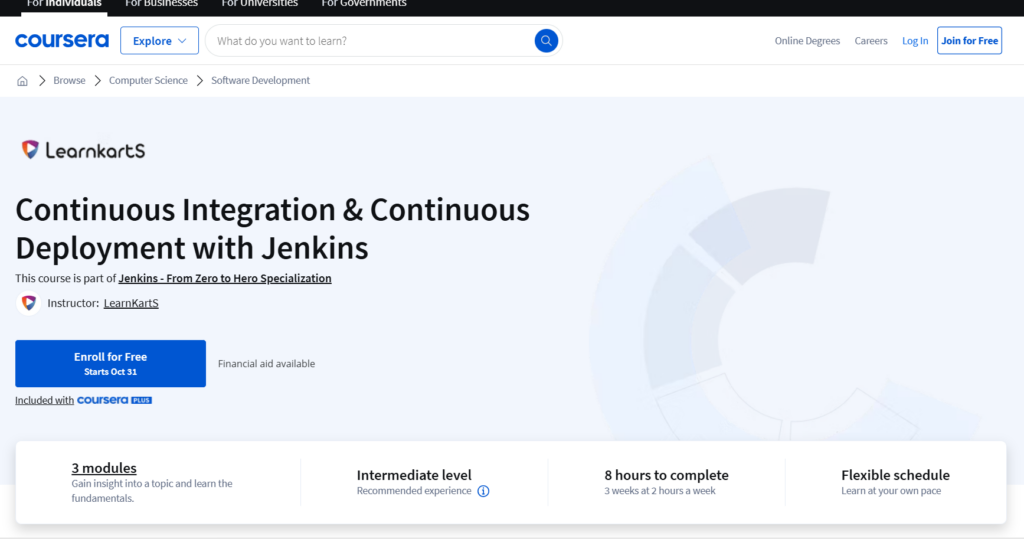
This course focuses on creating and managing CI/CD pipelines with Jenkins, emphasizing automation for efficient deployment processes. It covers Jenkins setup, pipeline configuration, and integration with various tools to support continuous integration and deployment.
- Who It’s For: DevOps professionals and developers looking to enhance their Jenkins skills
- Topics Covered:
- Jenkins configuration and Git integration
- Build automation with Maven
- Tomcat installation and deployment
- Parameterized builds and email notifications
- Jenkins pipelines and CLI usage
- Jenkins X and Docker for advanced CI/CD
- Online, In-Person, or Both? Online
- Exam Required? No
- Duration: 8 hours
- How Many Hours Of Instruction: 2 hours per week (self-paced)
- Eligibility Requirements:
- Basic understanding of DevOps
- Basic understanding of CI/CD and Jenkins concepts and features
- Price: Enroll for free
- Take The Course: Coursera
What’s Next?
With CI/CD practices driving efficiency and quality in software delivery, investing in the right course can make a huge difference in your career. The courses listed here provide a variety of learning paths tailored to different experience levels and goals. By choosing the one that suits you best, you'll be well on your way to mastering CI/CD and contributing to more seamless software development processes.
Boost your SaaS growth and leadership skills. Subscribe to our newsletter for the latest insights from CTOs and aspiring tech leaders. We'll help you scale smarter and lead stronger with guides, resources, and strategies from top experts!


